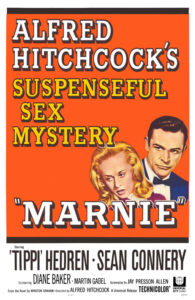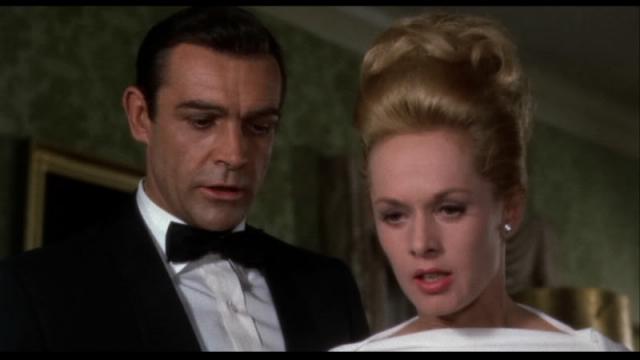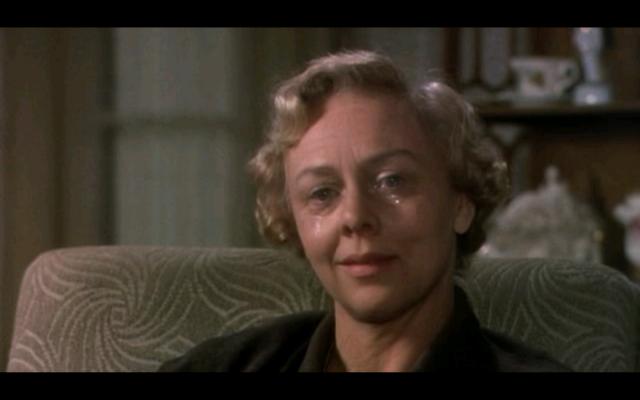Marnie (1964)
“I’m sick?! Well, take a look at yourself!”
|
Synopsis: |
|
Genres, Themes, Actors, and Directors:
Response to Peary’s Review: The truth about this undeniably polarizing film probably lies somewhere in between these two sentiments. Yes, Hitchcock’s use of rear-view projections definitely looks and feels artificial at this point in cinematic history (but would a Hitchcock film be complete without them?). Ultimately, for those who give themselves over to Marnie’s predicament, and who are willing to accept the inevitable artificialities sprinkled throughout any Hitchcock film, Marnie eventually becomes (as Peary argues) an absorbing story of psychological sleuthing and marital growth — a film “about a woman with many aliases who is involved in a desperate search for identity“. The fact that Connery drolly admits to Marnie that he’s far from perfect (when she accuses him of being just as screwy as she is) allows us to accept these two individuals as uniquely flawed; and although Connery’s amateur psychoanalyzing may indeed come across these days as “too pat”, we admire his determination to help Marnie, and can’t help rooting for them as a couple. While Hedren’s acting doesn’t particularly impress during the earlier parts of the film (when her character in general is still a mystery to us), she eventually digs more deeply into her role, allowing us to clearly see Marnie’s vulnerabilities, and to understand that this is not a woman out to blithely take advantage of men — she has deep-seated “reasons” for acting the way she does. Connery’s casting is unconventional (and it’s true, as DVD Savant argues, that we never “believe that Sean Connery — looking his 007 best — is an American businessman”), but he’s appealing in an undeniably tricky role; and as Peary notes in his Cult Movies 2, the fact that “James Bond” — who’s “capable of seducing lesbian Pussy Galore” — is unable to seduce his own wife on his honeymoon speaks volumes about the depth of Marnie’s sexual neuroses. Supporting performances in the film are fine as well, with Louise Latham particularly impressive in a small but important role as Marnie’s mother — a woman we want to revile (since she’s clearly the cause of Marnie’s miseries) but are ultimately too intrigued by to simply hate. Note: Watch for Bruce Dern in a tiny role as the key figure in Marnie’s recurring nightmares (only revealed at the end of the film); 12 years later, Dern would return to star in Hitchcock’s final film, Family Plot (1976). Redeeming Qualities and Moments:
Must See? Categories (Listed in 1001 Movies You Must See Before You Die) Links: |



2 thoughts on “Marnie (1964)”
An absolute must! As I always say, I’m not a huge Hitchcock fan…but this is a masterpiece.
Yes, it has been a maligned work and, even now, I think it’s under-appreciated. But it’s one of the most chilling tales about sex going. This thing drips with sexual angst – and we’ve much to learn from it. Critics can say what they want about Hitch’s use of matte paintings/rear-view projections (both of minimal distraction) and ‘Psychology 101’, but side-tracked criticisms such as those indicate a denial of the film’s power.
First and foremost, ‘Marnie’ benefits immensely from Jay Presson Allen’s adaptation of Winston Graham’s novel. (I like how Graham is credited right under the opening title on-screen; a rare acknowledgement for a novelist. As well, I recall reading the book as a youngster.) Allen’s script is tough and taut, filled with gripping, to-the-point sequences. The opening shot alone is a stunner: we see a handbag under the arm of a woman walking ahead. What do we wonder as the camera then pulls back?: …What’s in that bag? We are indirectly informed that we’re about to watch a film about a secret kept under wraps.
(By the way, Allen’s work also includes adaptations of ‘The Prime of Miss Jean Brodie’, ‘Cabaret’, and several films for Sidney Lumet, including – surprisingly – uncredited rewriting of David Mamet’s script for ‘The Verdict’: I wonder if *that’s* why I like that best of all of Mamet’s scripts…)
What’s most intriguing about Marnie as a character is her arrested development. A number of times we come to realize that she has remained a little girl, and is now rebelling against the captivating, highly intelligent adult she has grown into, does not understand and, therefore, cannot ‘master’. Since she can’t for a minute understand that adult, she plays games with it – and uses it as a recurring means of revenge. To me, nothing foolish at all about what goes on inside her. It’s stunted; chasing its own tail.
Too many scenes to mention work wonderfully. A fave, tho, is two-fold: first Marnie is hiding out in a ladies’ room, waiting for the ‘all-clear’ that everyone has gone home. (Terrific shadow work there.) Once she’s certain she’s alone, she plays out a robbery – and is almost undone by a hard-of-hearing cleaning lady. The tension in this long sequence is classic Hitch…palpable.
‘Marnie’ is the type of rich, psychological thriller that’s fascinating to explore through repeated viewings. It’s enriched by Bernard Herrmann’s pulsating score (one of my favorites of his), and beautifully crafted (shot by Robert Burks, edited by George Tomasini, designed by Robert Boyle).
Much has been written about the ‘dark side’ of Hitchcock as a man – i.e, his obsession with blondes, both in front of the camera and behind. Who knows what’s true or what weird personal demons he may have had? Was Hedren the ultimate ‘frustration’ for him? All I know is (for this and for ‘The Birds’), I’m on *her* side. I think Hedren gives a very brave and remarkable performance from start to finish – deliciously nuanced throughout.
Connery is equally impressive, turning in some of his best work ever (and supplied with many silky lines, like “You’re very sexy with your face clean.”). I also get a kick out of Diane Baker as his worshipping sister-in-law (when he asks her why she doesn’t have a bf: “I was waiting for you; I’m queer for liars.”) and Mariette Hartley in a small, somewhat comic role as a secretary early on. Latham does well as Marnie’s mother (even if she now unfortunately comes off a bit like Carol Burnett for those very familiar with Burnett’s tv work).
[Note: At imdb.com, you can see the trailer that was shown in theaters. In it (as with ‘Psycho’), Hitch introduces ‘Marnie’ lightheartedly, with jokes that don’t really land that well. I can’t help thinking, by doing so, he did his promotion work – and the film – a disservice. Such was Hitch’s approach when he introduced his television stories. But to give feature films the same jovial treatment…esp. something as hard-hitting as ‘Marnie’? I would have advised against it.]
⭐️⭐️⭐️
A decent, under rated film hamstrung by making it’s leading man a rapist; which the film never really recovers from once it’s revealed. As a Hitchcock film it’s a must see.